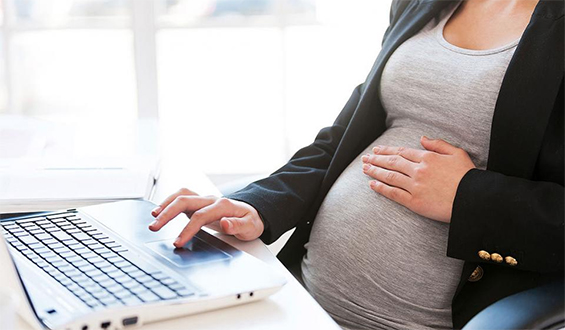
A quarter of employed US moms return to work within two weeks of giving birth, reports a new study from nonprofit magazine In These Times. The data used in the report came from the Department of Labor and personal stories from mothers who kept working after childbirth, albeit through pain and grief.
The Washington Post’s Danielle Paquette says American mothers do not have super powers of recovery, nor do they value their jobs over their newborn babies. Some US moms have to get back to work as soon as they can because they cannot afford a pay cut. So, whether their C-section incisions have healed or not, they get back into the office.
National data shows that only 13% of workers in the US have any paid leave, according to the Bureau of Labor Statistics. And Pew Research Center data shows that 40% of US households with children under 18 rely on a mother’s income. A 2012 Department of Labor survey polled all workers who had taken family or medical leave. In These Times found that 23% of women who left work to care for their newborns took less than two weeks off.
And for less educated workers the situation is worse. Eighty percent of college grads took at least six weeks of childcare leave, while only 54% of women without degrees took equivalent time. Approximately 43 million US workers have no paid sick leave or time off for parents to care for sick kids.
The highest paid workers are often given the most generous benefits. Eighty-eight percent of managers and financial workers in the private sector enjoy paid time off, much higher than service workers (40%) and construction workers (38%).
Sharon Lerner, reporting for In These Times, says Sweden gives workers 16 months paid parental leave, and Finland, after a 9 month paid leave, gives one of the parents an additional paid “child care leave” until the the child’s third birthday. However, except for a few small countries like Papua New Guinea and Suriname, every other nation in the world now requires paid maternity leave.
Research exists showing that paid maternity leave may be a matter of life and death for some children. Christopher Ruhm, a professor of public policy and economics at the University of Virginia, researched the correlation between death rates and paid leave in 16 European countries. He found that a 50-week extension in paid leave was associated with a 20% drop in infant deaths.
This month, Netflix announced it would give new mothers and fathers as much time off as they wanted during their child’s first year, and USA Today reported that Microsoft would increase paid leave to 12 weeks, with eight more available for moms, reports Lois M. Collins of Deseret News.
FlexJobs surveyed 1,100 parents with children 18 or younger living at home and reported that 90% of participants said they “needed” to work, while 63% said they wanted to work. Justine Hofherr, writing for The Boston Globe, says over half of the parents surveyed said their enjoyment of their work was one of the top reasons for having a job. They said they enjoyed working ahead of working to save for retirement, luxury goods, or travel.
Forty-one percent of parent respondents said they work because they want to have a professional impact on the world. The survey showed that over 90% of parents said they could be great parents and great employees at the same time.
Millenial men say they have every intention of sharing caregiving duties, but when the child is born they fear they will be stigmatized for taking time off work.
Few in US Have Paid Parenting Leave
0
Share.




